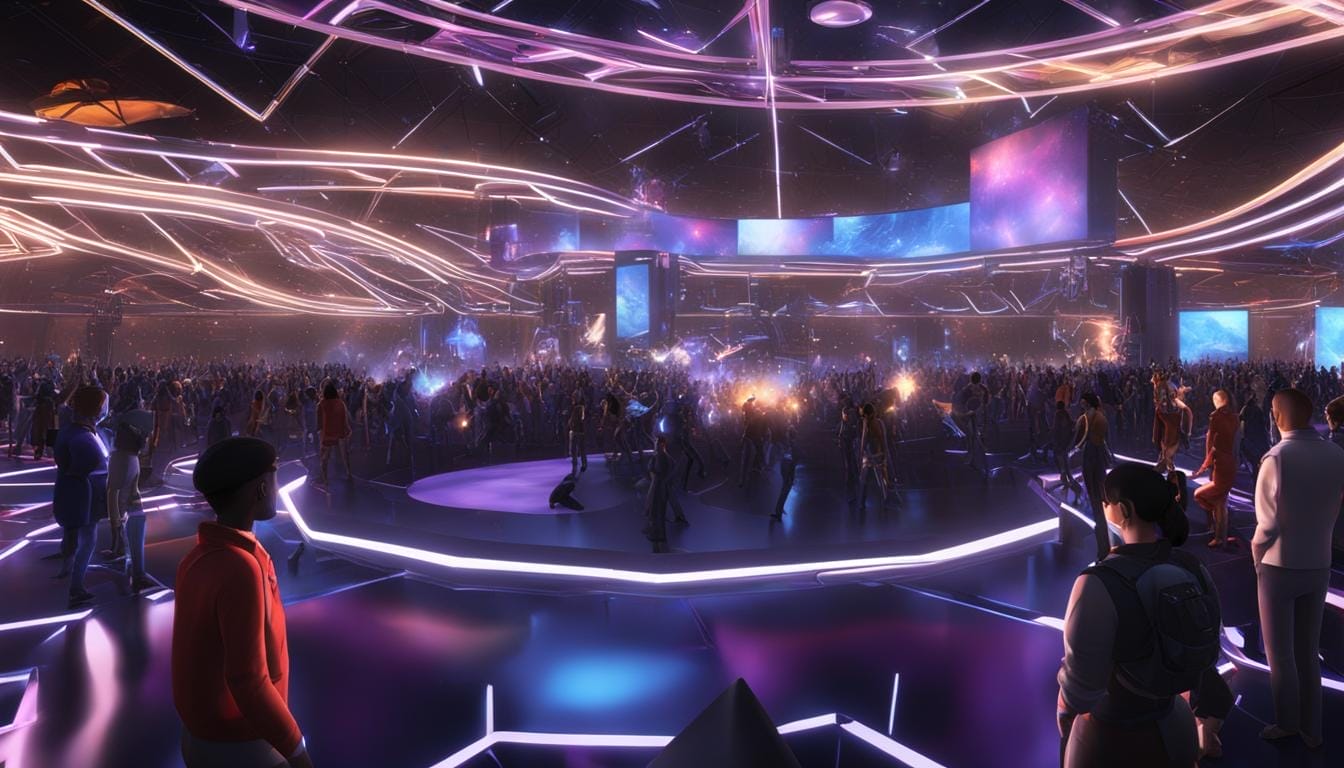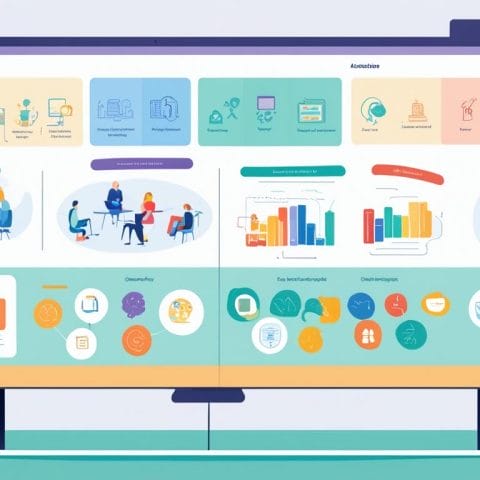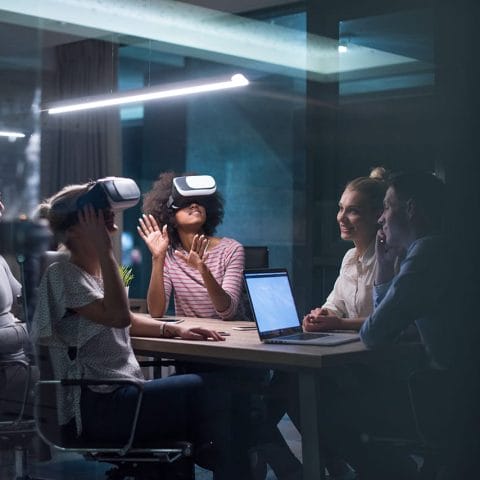Welcome to the exciting world of metaverse events! Planning your first metaverse event can be a thrilling adventure filled with endless possibilities. Whether you’re diving into virtual event planning or looking to enhance your existing event strategy with immersive experiences, this guide is here to help you get started.
When it comes to planning a metaverse event, there are several key factors to consider. From defining your event concept and goals to choosing the right platform and understanding the unique aspects of hosting events in the metaverse, each step plays a crucial role in creating a captivating and immersive digital experience for your audience. Let’s explore the essential elements of planning your first metaverse event in more detail.
Key Takeaways:
- Define your event concept and goals before diving into the planning process.
- Choose the right metaverse platform that aligns with your event requirements.
- Understand the unique aspects of event management in the metaverse.
- Pay attention to technical setup to ensure flawless audio-visual quality.
- Implement effective marketing and promotion strategies to attract attendees.
Understanding Event Management in the Metaverse
Event management in the metaverse encompasses the planning, coordination, and execution of events within virtual and augmented reality environments. Virtual platforms have transformed the way events are organized and experienced, allowing for immersive and interactive experiences for participants in the digital space. Whether it’s a conference, concert, exhibition, workshop, or social gathering, event managers can leverage the unique capabilities of the metaverse to create captivating and memorable events.
In the metaverse, event managers have the opportunity to think outside the box and design events that transcend geographical boundaries. They can create virtual spaces that replicate real-world venues, customize avatars or digital representations, and incorporate interactive features such as live chat and virtual networking areas. By harnessing the power of technology, event managers can enhance engagement and provide a more dynamic experience for attendees.
Moreover, event management in the metaverse requires a deep understanding of the digital landscape. It involves navigating virtual platforms, familiarizing oneself with the technical aspects of hosting events in the metaverse, and staying up to date with emerging technologies. Virtual event organization requires a unique skill set that combines event planning expertise with digital fluency.
“The metaverse presents event managers with exciting opportunities to create innovative and experiential events. It allows us to break free from the limitations of physical spaces and explore new dimensions of event management. By embracing the metaverse, we can reimagine how events are planned, executed, and experienced.”
Key Considerations for Event Management in the Metaverse
- Choosing the right virtual event platform that aligns with the event goals and requirements
- Understanding the technical setup and ensuring flawless audio-visual quality
- Implementing effective marketing and promotion strategies to attract attendees
- Providing real-time technical support during the event to address any issues
- Engaging in post-event activities and maintaining connections with attendees
Table: Comparison of Metaverse Platforms
| Platform | Features | User Experience | Pricing |
|---|---|---|---|
| Hyperspace | Customizable virtual spaces, interactive elements, live streaming integration | Intuitive navigation, visually appealing interface | Subscription-based pricing model with tiered options |
| Decentraland | User-generated content, decentralized ownership, virtual land marketplace | Visually immersive, seamless interaction with virtual objects | Virtual land and asset ownership requires cryptocurrency investment |
| Meetaverse | Real-time collaboration, customizable avatars, multi-platform compatibility | Engaging and interactive interface, easy communication features | Flexible pricing plans based on event size and duration |
Choosing the right metaverse platform is a critical decision that can significantly impact the success of a virtual event. It is important to consider the features, user experience, and pricing options offered by different platforms before making a choice.
By understanding the intricacies of event management in the metaverse and making informed decisions at each stage of the planning process, event managers can create immersive and engaging digital experiences for their audiences. As the metaverse continues to evolve, so do the possibilities for innovation and transformative event experiences in the digital realm.
Choosing the Right Metaverse Platform
When planning a metaverse event, one of the crucial decisions you’ll need to make is choosing the right platform. The platform you select will play a significant role in determining the success of your virtual event. There are several key factors to consider when evaluating different metaverse platforms.
Platform Capabilities
Consider the platform’s capabilities and features that align with your event goals. Does the platform support live streaming, interactive elements, and networking opportunities? Look for platforms that offer customizable options and tools to create a unique and engaging experience for your attendees.
User Experience
Another important aspect to consider is the user experience. How intuitive is the platform for both organizers and participants? Is the virtual environment easy to navigate? Look for platforms that prioritize user-friendliness to ensure a smooth and enjoyable experience for all involved.
Pricing
Take into account the pricing structure of the metaverse platform. Different platforms may have varying pricing models, such as one-time fees, subscription-based plans, or pay-per-attendee options. Consider your budget and the expected attendance to choose a platform that offers the best value for your investment.
| Platform | Capabilities | User Experience | Pricing |
|---|---|---|---|
| Hyperspace | Live streaming, interactive elements, customizable options | Intuitive navigation, immersive virtual environment | Subscription-based pricing |
| Decentraland | Virtual reality experiences, user-generated content | 3D interactive environment, user-friendly interface | Pay-per-attendee pricing |
| Meetaverse | Networking opportunities, virtual meeting rooms | Seamless integration with productivity tools, easy collaboration | One-time fee |
Ultimately, choosing the right metaverse platform is about finding the best fit for your specific event needs. Evaluate the capabilities, user experience, and pricing of each platform to make an informed decision. By selecting the right platform, you can create an immersive and memorable virtual event experience.
Defining the Event Concept and Goals
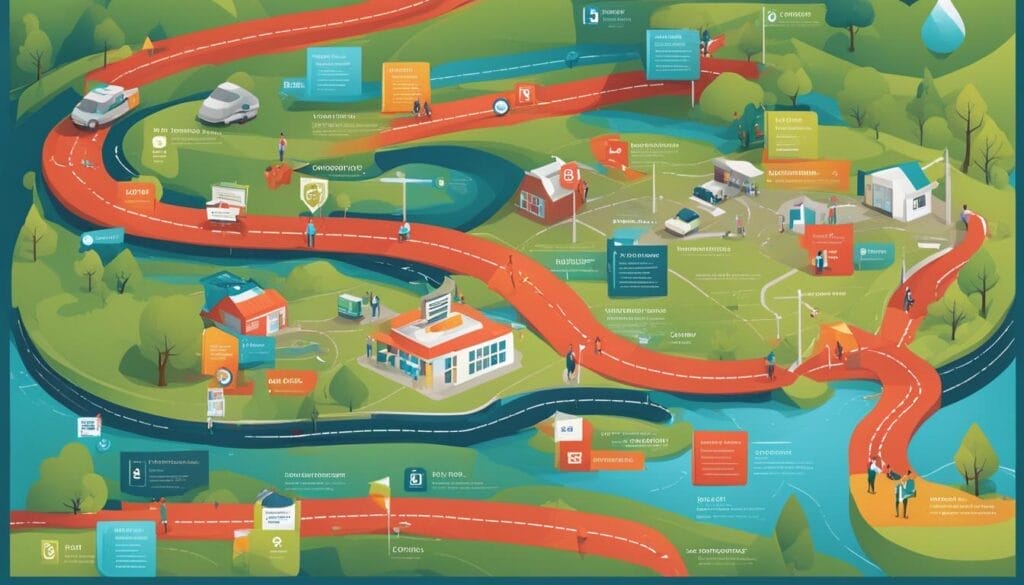
Before diving into the details of event planning, it is crucial to define the concept and goals of your metaverse event. This initial step will lay the foundation for a successful and engaging digital experience. By clearly understanding what you want to achieve and the purpose of your event, you can design a strategy that aligns with your objectives.
Setting Clear Objectives
The first aspect of defining your event concept and goals is setting clear objectives. Ask yourself what you hope to accomplish through this metaverse event. Are you aiming to educate, entertain, or connect with your audience? Do you have specific targets for attendance, engagement, or revenue? Establishing SMART goals (Specific, Measurable, Achievable, Relevant, Time-bound) will provide clarity and focus throughout the planning process.
Assembling a Team
Once you have a clear understanding of your event objectives, it’s time to assemble a dedicated team to bring your vision to life. Include individuals with diverse skills and expertise, such as event planners, marketers, designers, and technical specialists. Collaborating with a team will ensure that all aspects of your metaverse event are carefully considered and executed.
Selecting a Platform
Choosing the right metaverse platform is a critical step in defining your event concept and goals. Consider the features and capabilities offered by various platforms, such as virtual reality experiences, interactive elements, and networking functionalities. Evaluate how well each platform aligns with your event objectives and the preferences of your target audience.
By taking the time to define your event concept and goals, you set yourself up for success in planning and executing a captivating metaverse event. With clear objectives, a dedicated team, and a suitable platform, you can create an immersive digital experience that leaves a lasting impression on your audience.
Technical Setup for Metaverse Events
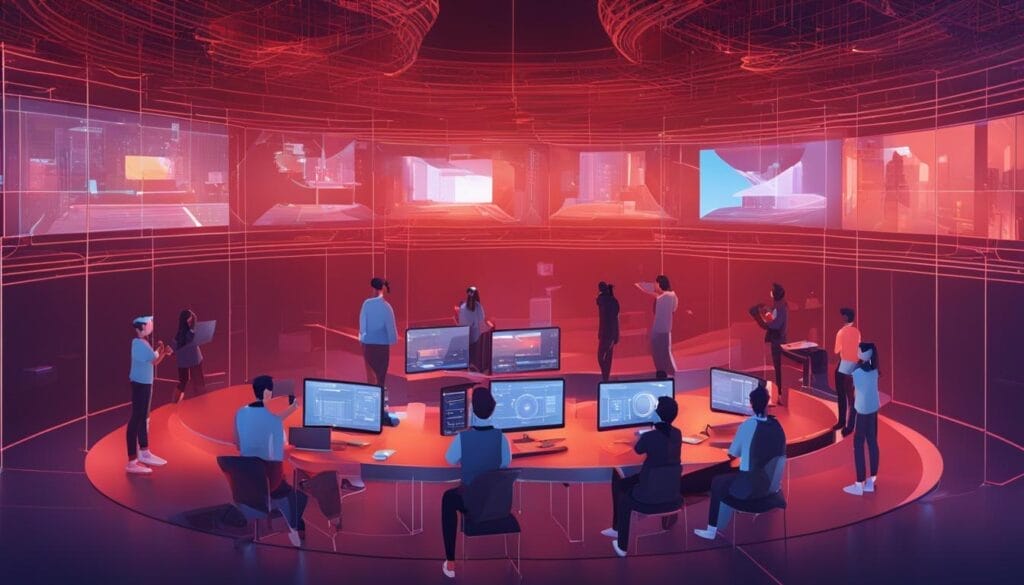
The technical setup is a crucial aspect of hosting successful metaverse events. It involves transforming the event concept into a functional virtual experience that immerses participants in a digital world. To ensure a seamless event experience, event planners need to pay attention to various technical elements.
Virtual Platform Setup
Choosing the right metaverse platform is the first step in the technical setup process. Platforms like Hyperspace, Decentraland, and Meetaverse offer different features and customization options. Once the platform is selected, event planners need to set up the virtual space, define the event layout, and create interactive elements. This includes designing a visually appealing environment, arranging virtual booths or stages, and integrating features like live chat and virtual networking areas.
Avatar Creation and Representation
Creating avatars or digital representations is an integral part of metaverse events. Attendees use avatars to navigate the virtual space and interact with others. Event planners should provide participants with customization options to make their avatars unique. Additionally, avatars should be designed to reflect the event theme or brand identity, enhancing the overall immersive experience.
Audio-Visual Quality and Technological Support
To ensure a seamless event experience, event planners must prioritize audio-visual quality. This includes using high-quality streaming technologies, testing audio levels, and ensuring clear visuals. Technical support teams should be on standby to address any issues that arise during the event, such as sound or video disruptions. Regular monitoring of technical performance is essential to identify and resolve any potential issues promptly.
| Technical Setup Checklist | Notes |
|---|---|
| Choose a suitable metaverse platform | Consider features, user experience, and pricing |
| Create a visually appealing virtual environment | Align with event concept and brand identity |
| Integrate interactive elements | Live chat, virtual networking areas, etc. |
| Offer avatar customization options | Reflect event theme and brand identity |
| Ensure high-quality audio-visual streaming | Test audio levels and video quality |
| Provide real-time technical support | Address any issues promptly |
By carefully planning and executing the technical setup for metaverse events, event planners can create immersive and engaging experiences for participants. A flawless audio-visual experience, combined with a well-designed virtual environment and interactive elements, sets the stage for a successful event that captures the audience’s attention and fosters meaningful connections.
Marketing and Promotion for Metaverse Events
Marketing and promotion play a crucial role in the success of any metaverse event. With a growing number of digital event options available, it is essential to implement effective strategies to attract attendees and generate buzz. To maximize event visibility and reach a wider audience, event organizers should utilize both conventional and metaverse-specific marketing platforms.
One effective way to create excitement and anticipation for a metaverse event is to create captivating event content, such as trailers and teasers. These short videos can provide a glimpse into what attendees can expect, showcasing the immersive and engaging aspects of the event. Sharing these videos on social media platforms, along with relevant event hashtags, can help generate interest and encourage potential attendees to register.
Another strategy to increase event visibility is to leverage social media channels and influencer alliances. Partnering with influencers who have a strong presence in the metaverse or virtual reality community can help reach a broader audience and build credibility for the event. Influencers can promote the event through their channels, share updates, and engage with their followers to generate excitement and encourage attendance.
Implementing ticketing systems and tier-based access alternatives can also be effective in encouraging attendance and maximizing engagement. By offering different ticket options, such as VIP access or early bird discounts, event organizers can create a sense of exclusivity and urgency. Additionally, offering virtual swag or exclusive in-game items as part of the ticket package can further incentivize attendees to purchase tickets and participate in the event.
The Power of Social Media
Social media platforms, such as Twitter, Instagram, and LinkedIn, can be instrumental in promoting metaverse events. Event organizers should create dedicated event pages or profiles on these platforms to share updates, engage with potential attendees, and build a community around the event. Utilizing event-specific hashtags and encouraging user-generated content can help generate buzz and increase event visibility.
In addition to traditional social media platforms, event organizers should also consider utilizing metaverse-specific platforms for marketing and promotion. Platforms such as Decentraland and Cryptovoxels have built-in communities and marketplaces where event organizers can promote their events and reach a targeted audience interested in virtual experiences.
SEO and Online Advertising
Optimizing the event website and content for search engines can also help increase visibility and attract organic traffic. By incorporating relevant keywords and meta tags, event organizers can improve their website’s ranking in search engine results and increase the likelihood of reaching potential attendees.
Online advertising, such as Google Ads or social media ads, can also be effective in promoting metaverse events. Event organizers can target specific demographics or interest groups to ensure their ads reach the right audience. Utilizing eye-catching visuals and compelling ad copy can help capture the attention of potential attendees and encourage them to learn more about the event.
Execution of Metaverse Events
The execution phase of a metaverse event is where meticulous planning and preparation come together to create an immersive experience. Participants engage, network, and attend events within the virtual setting, while presenters deliver speeches and presentations. Real-time technical support is crucial to address any issues that may arise, and monitoring engagement data and technical performance ensures optimal event experience.
During the execution phase, event organizers must ensure that all technical aspects are working seamlessly. This includes the audio-visual setup, live streaming capabilities, and interactive features such as Q&A sessions and virtual networking areas. Real-time support personnel should be readily available to troubleshoot any technical glitches and provide assistance to participants who may encounter difficulties.
The success of a metaverse event depends on the engagement and interaction of its participants. Organizers must encourage attendees to actively participate through polls, surveys, and interactive activities. By fostering a sense of community and collaboration, virtual events can deliver a unique and memorable experience that rivals traditional in-person gatherings.
“The execution phase is where all the planning and preparation truly come to life. It’s the moment when event organizers can witness the engagement and enthusiasm of their audience. By providing a seamless technical experience and encouraging active participation, metaverse events have the potential to revolutionize the way we connect and interact in the digital world.” – Event Planning Expert
Real-Time Data Monitoring and Analysis
To ensure the success of a metaverse event, it is vital to continuously monitor and analyze engagement data and technical performance. This includes tracking participant behavior, session attendance, and overall event satisfaction. Real-time data allows organizers to make necessary adjustments on the spot, enhancing the event experience and addressing any issues that may arise.
By closely monitoring engagement data, event organizers can gain valuable insights into participant preferences, interests, and pain points. This information can be used to improve future events and tailor content to better suit the target audience. Additionally, analyzing technical performance data can help identify areas for optimization and ensure a smooth and uninterrupted virtual event experience.
| Data to Monitor | Key Insights |
|---|---|
| Attendance/Registration Numbers | Evaluate event popularity and marketing effectiveness |
| Session Engagement (e.g., session duration, interaction) | Identify popular sessions and areas for improvement |
| Participant Feedback/Satisfaction Surveys | Measure event success and gather valuable feedback for future improvements |
| Technical Performance (e.g., streaming quality, platform stability) | Ensure a smooth and seamless virtual event experience for all participants |
By leveraging real-time data monitoring and analysis, event organizers can continuously improve the execution of metaverse events and deliver a truly immersive and engaging experience for participants.
Post-Event Activities and Engagement
After your metaverse event concludes, it’s crucial to continue engaging with attendees and gathering valuable feedback to improve future events. Implementing post-event activities will help maintain connections, extend the reach of your event, and foster long-term relationships with participants.
One effective post-event activity is conducting surveys or polls to collect attendee input and satisfaction ratings. This feedback allows you to understand what worked well and what areas can be improved for future events. Use these insights to refine your event strategy and enhance the overall experience for attendees.
Sharing highlights or recorded sessions from your metaverse event is another way to keep the momentum going. Utilize your social media channels to share snippets of the event, showcasing the most exciting moments. This serves as a reminder for those who attended and creates intrigue for those who missed out. By extending the event’s lifespan on social media, you can continue generating buzz and attracting new audiences.
In addition to surveys and social media, consider organizing virtual meetups or networking opportunities. These post-event gatherings provide a space for attendees to connect with one another and continue building relationships. Encourage participants to share their experiences and insights, shaping a community around your event. This engagement will help solidify your event brand and create a loyal following.
Benefits of Post-Event Engagement:
- Gain valuable feedback and insights from attendees
- Extend the reach and visibility of your event through social media
- Foster long-term relationships with participants and build a community
- Continuously improve your event strategy based on attendee feedback
Remember, the success of your metaverse event doesn’t end with its conclusion. By actively engaging attendees post-event, you can maximize the impact of your event and set the stage for future immersive experiences.
| Key Post-Event Activities | Benefits |
|---|---|
| Conduct surveys and polls | Gather valuable feedback to improve future events |
| Share highlights and recorded sessions | Extend the event’s lifespan on social media and attract new audiences |
| Organize virtual meetups and networking opportunities | Foster relationships and create a community around your event |
Conclusion
Virtual reality events and augmented reality experiences have revolutionized the landscape of digital event planning. By embracing the capabilities of metaverse platforms, event planners can create extraordinary and immersive events that transcend the limitations of geographical boundaries. These events offer a wide range of interactive features, allowing attendees to engage and network in ways never seen before.
As technology continues to evolve, the future of event planning holds even more potential for innovation and transformative experiences. Virtual reality events provide an opportunity to create captivating and memorable experiences that leave a lasting impression on participants. By incorporating elements of augmented reality, events can be further enhanced, providing a seamless blend of digital and physical worlds.
With careful planning and utilization of these emerging technologies, event planners can harness the power of virtual reality and augmented reality to deliver exceptional events. From conferences to concerts, the possibilities are endless, opening up new avenues for creativity and engagement. As we look to the future, it is clear that virtual reality and augmented reality will continue to shape the landscape of event planning and deliver extraordinary experiences.
FAQ
What is event management in the metaverse?
Event management in the metaverse refers to the planning, coordination, and execution of events within virtual and augmented reality environments.
How do I choose the right metaverse platform for my event?
When choosing a metaverse platform, consider factors such as capabilities, user experience, and pricing to ensure it aligns with your event goals and requirements.
Why is defining the event concept and goals important?
Defining the event concept and goals helps set clear objectives, assemble a team, select a platform, budget, and develop an interesting event concept.
What is involved in the technical setup for a metaverse event?
The technical setup for a metaverse event includes setting up the chosen platform, creating avatars or digital representations, developing the virtual space, and integrating interactive elements such as live chat and virtual networking areas.
How can I effectively market and promote my metaverse event?
Utilize conventional and metaverse-specific marketing platforms, create captivating event content, leverage social media channels and influencer alliances, and implement ticketing systems and tier-based access alternatives.
What happens during the execution phase of a metaverse event?
During the execution phase, participants engage, network, and attend events within the virtual setting, while presenters deliver speeches and presentations. Real-time technical support is crucial, and monitoring engagement data and technical performance ensures an optimal event experience.
What should I do after the metaverse event is over?
Conduct surveys or polls to gather feedback, share highlights or recorded sessions on social media, follow up with virtual meetups or networking opportunities, and utilize user-generated content to extend the event’s reach.

